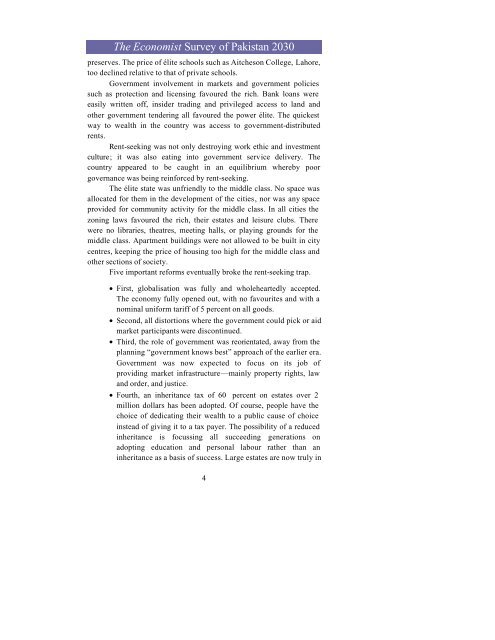economist-survey
economist-survey
economist-survey
You also want an ePaper? Increase the reach of your titles
YUMPU automatically turns print PDFs into web optimized ePapers that Google loves.
The Economist Survey of Pakistan 2030<br />
preserves. The price of élite schools such as Aitcheson College, Lahore,<br />
too declined relative to that of private schools.<br />
Government involvement in markets and government policies<br />
such as protection and licensing favoured the rich. Bank loans were<br />
easily written off, insider trading and privileged access to land and<br />
other government tendering all favoured the power élite. The quickest<br />
way to wealth in the country was access to government-distributed<br />
rents.<br />
Rent-seeking was not only destroying work ethic and investment<br />
culture; it was also eating into government service delivery. The<br />
country appeared to be caught in an equilibrium whereby poor<br />
governance was being reinforced by rent-seeking.<br />
The élite state was unfriendly to the middle class. No space was<br />
allocated for them in the development of the cities, nor was any space<br />
provided for community activity for the middle class. In all cities the<br />
zoning laws favoured the rich, their estates and leisure clubs. There<br />
were no libraries, theatres, meeting halls, or playing grounds for the<br />
middle class. Apartment buildings were not allowed to be built in city<br />
centres, keeping the price of housing too high for the middle class and<br />
other sections of society.<br />
Five important reforms eventually broke the rent-seeking trap.<br />
• First, globalisation was fully and wholeheartedly accepted.<br />
The economy fully opened out, with no favourites and with a<br />
nominal uniform tariff of 5 percent on all goods.<br />
• Second, all distortions where the government could pick or aid<br />
market participants were discontinued.<br />
• Third, the role of government was reorientated, away from the<br />
planning “government knows best” approach of the earlier era.<br />
Government was now expected to focus on its job of<br />
providing market infrastructure—mainly property rights, law<br />
and order, and justice.<br />
• Fourth, an inheritance tax of 60 percent on estates over 2<br />
million dollars has been adopted. Of course, people have the<br />
choice of dedicating their wealth to a public cause of choice<br />
instead of giving it to a tax payer. The possibility of a reduced<br />
inheritance is focussing all succeeding generations on<br />
adopting education and personal labour rather than an<br />
inheritance as a basis of success. Large estates are now truly in<br />
4




